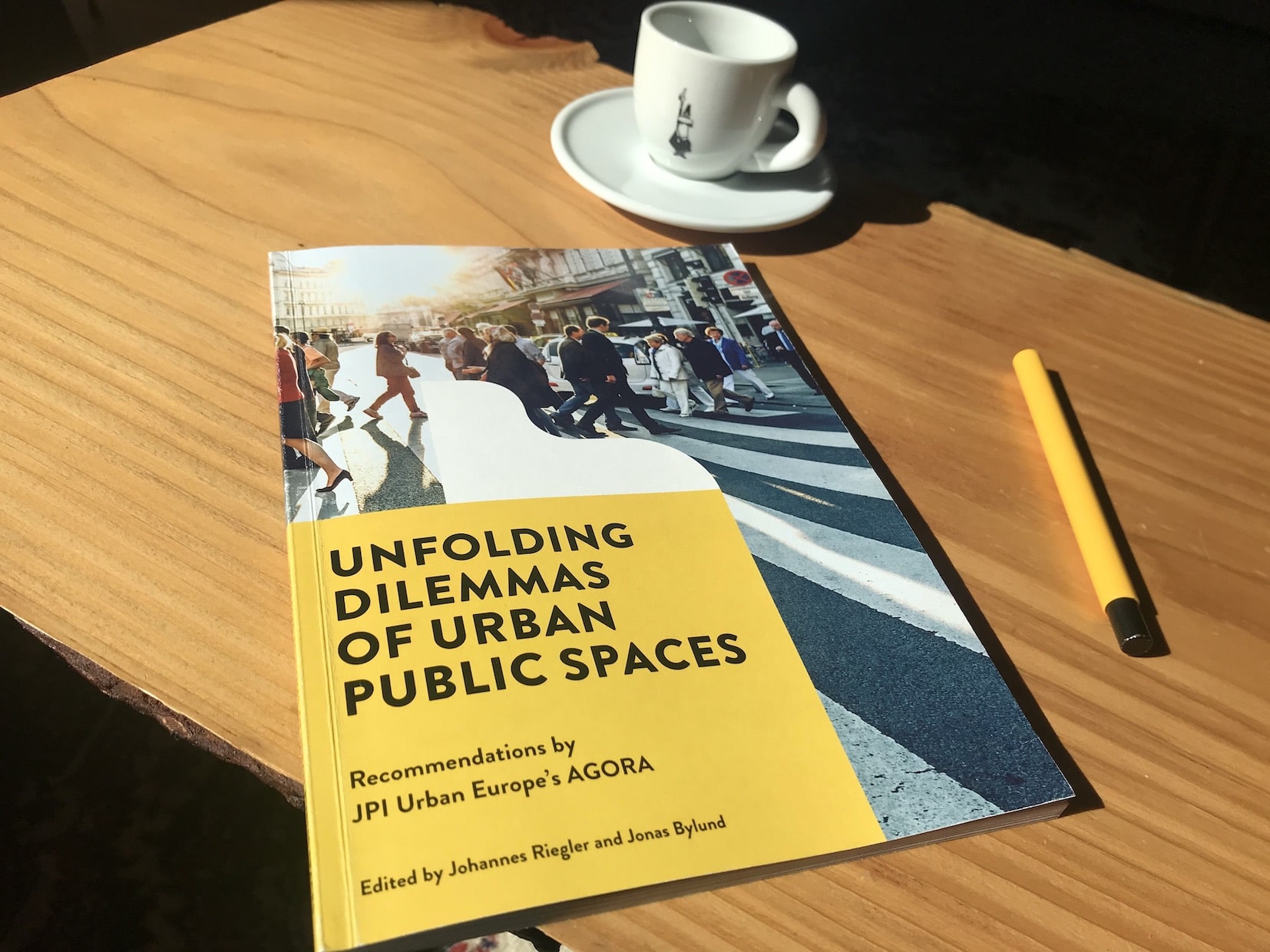Join JPI UE
Faq
FAQ
Please click here for the frequently asked questions we collected.
If you have an additional questions you are welcome to mail us at info@jpi-urbaneurope.eu
The full report can be downloaded here:
Unfolding Dilemmas of Urban Public Spaces – Recommendations by JPI Urban Europe’s AGORA.

Urban public spaces fulfil important societal functions and shape many of the characteristics of cities and urban areas. However, there are several dilemmas (competing goals, interests, strategies, wicked issues, etc.) involved in their development and maintenance. In simpler terms, addressing one issue/challenge in an urban context might have negative effects in another realm. Regarding urban public spaces, for instance, typical crossings of concerns relate to everyone’s right to the city, openness to different societal groups, climate change actions and how to cater for safety and security without promoting increasingly exclusive spaces.
JPI Urban Europe organised dedicated events to identify dilemmas of public spaces with urban actors. The discussions took off in a session at the European Placemaking Week 2019 in Valencia. Representatives of public urban administration exchanged on their experiences and identified the most pressing dilemmas derived from their daily work (for a detailed summary click here). Building upon the discussions in Valencia, JPI Urban Europe organised a dedicated full day AGORA Dialogue in Riga In November 2019. The workshop brought 40 experts from 20 countries with transdisciplinary backgrounds to combine perspectives describe the most pressing dilemmas in detail (a review of the event can be found here). After the events a writing team of participants formed. The authors built upon the workshop results, brought the input into a larger picture of current discussions in policy and academia and derived recommendations to address dilemmas of urban public spaces. The results of this co-creation process are now available in form of the „Unfolding Dilemmas of Urban Public Spaces Report“.
The objective of the „Unfolding Dilemmas of Urban Public Spaces Report“ is to provide an accessible text which breaks down the complexity of the development and maintenance of public urban spaces into ‘bite-sized chunks’: a selected number of dilemmas which is not exhaustive of all issues and concerns. These chunks are to be seen as entry points for urban policy makers, practitioners, civil society organisations, the research community and all other urban actors. The report should inspire to look at interrelated urban challenges through the lens of urban dilemmas and provides policy recommendations to address the complexity.
Each chapter sets out one (or more) specific dilemma(s) connected to the creation and maintenance of inclusive public urban spaces. They highlight the interlinkages of urban public spaces to wellbeing, public health, inclusive societies, urban robustness, mobility, green spaces, etc. More concretely, Chapter 1, Reconfiguration of public spaces via Nature-Based Solutions by Aksel Ersoy (Delft University of Technology) and Ruth Yeoman (University of Oxford and Northumbria University) discusses the synergetic effects the implementation of Nature-Based Solutions in public spaces have to address environmental, social and economic challenges. Karin Peters (Wageningen University) and Dahae Lee (TU Dortmund) highlight the dilemma of ensuring inclusive and accessible public spaces in an austerity context in Chapter 2. It concludes with recommendation on how to encourage multi-stakeholder engagement for developing and maintaining public urban spaces to address the dilemma. Why Targeting the Gender Inequality Dilemma in Public Space is a central consideration when assessing urban sustainability is outlined in Chapter 3 by Caroline Wrangsten, (JPI Urban Europe), Chelina Odbert, Joe Mulligan (both Kounkuey Design Initiative), Emma Hill (University of Edinburgh) and Maria Angeli (Mediterranean Institute of Gender Studies). Chapter 4 by Ruth Yeoman (University of Oxford) and Karin Peters (Wageningen University) highlights how Inclusive Design and Public Urban Spaces can enhance the safety in neighbourhoods. Sandra Guinand, Yvonne Franz (both University of Vienna), Johannes Riegler (JPI Urban Europe) and Zala Velkavrh (prostoRož Cultural Association) address the potentials and limitations of co-creative temporary use projects in public urban spaces and what should be considered to prevent from effects which contradict efforts towards sustainable and liveable urban areas in chapter 5. Rethinking urban public spaces and re-allocating streetscapes for sustainability and liveability is discussed in chapter 6 by Florian Lorenz (Smarter Than Car) and Josh Grigsby (University of Vienna). Finally, Christoph Gollner (JPI Urban Europe) and Ruth Yeoman (University of Oxford) highlight the interrelation between inclusive, high quality public environments, the Meaningful City concept and the energy transition in chapter 7.
The COVID-19 pandemic hit Europe just about when the writing team of the AGORA Policy Paper started working on the publication in February/March 2020. This overlap left the authors with an odd feeling: Writing about liveable urban public spaces while in most countries people are asked to stay at home. For that reason, the foreword of the report reflects upon the role of public spaces for realizing robustness against shocks and crises.
The full report can be downloaded here: Unfolding Dilemmas of Urban Public Spaces – Recommendations by JPI Urban Europe’s AGORA.
For printed copies please contact johannes.riegler@jpi-urbaneurope.eu .